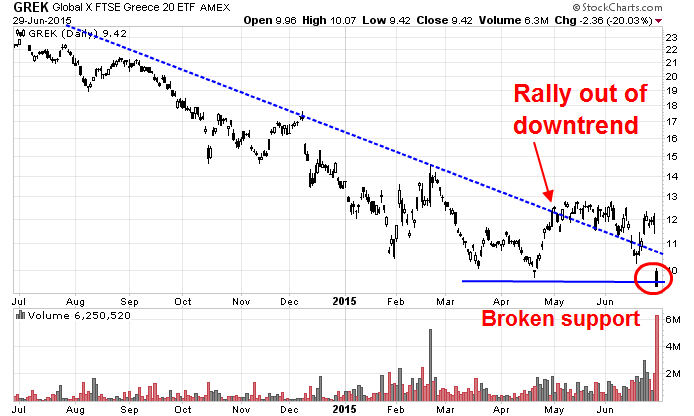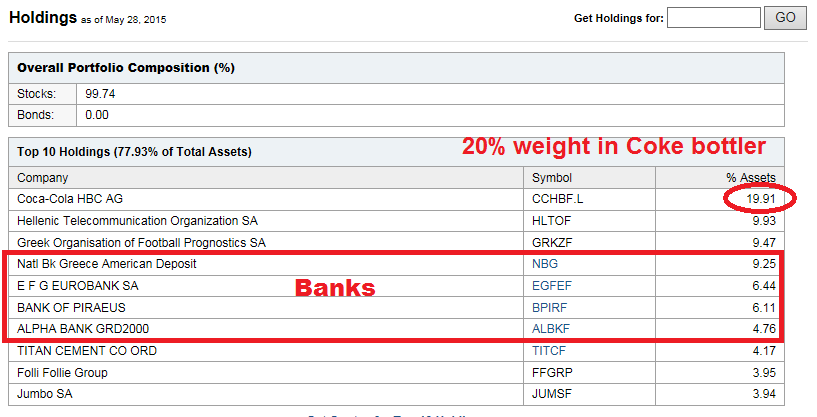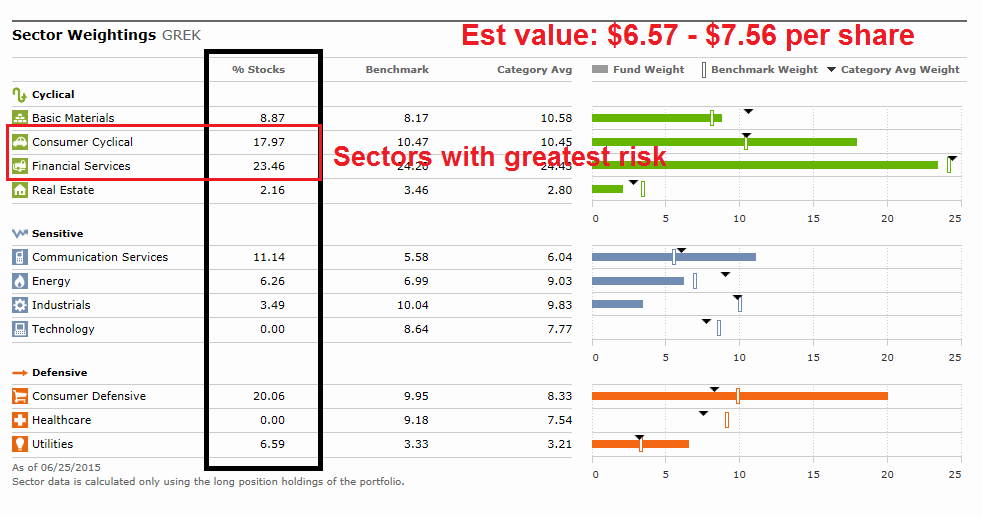With Greece in turmoil and the Athens Stock Exchange closed, one of the few ways investors can get exposure to Greek stocks is through the Global X FTSE Greece 20 ETF (NYSE:GREK), in addition to a number of listed ADRs.
As of the close on Monday, GREK was down 20% from Friday's close. Does this mean that speculators should step up and buy GREK in anticipation of a likely "Yes" vote in the upcoming referendum?
A quick glance at the chart gives us some good news-bad news readings. On one hand, the ETF rallied through a downtrend and the price has started to stabilize and go sideways, which is constructive. On the other hand, it broke support yesterday on high volume, which is a bad sign.
Deconstructing the portfolio
How about trying to value the ETF by looking at the components? My analysis of percentage holdings is based on Friday night's close, before the surprise referendum call and serves as a useful benchmark for valuation as that was the last time we had actual Athens Stock Exchange prices to compare against.
The following table, from Yahoo Finance, shows the top three holdings to be the local Coca-Cola bottler (OTC:CCHGY) at roughly 20% weight, the local telecom, Hellenic Telecommunications (OTC:HLTOY), at 10%, followed by the lottery operation Greek Organisation of Football Prognostics SA (AT:OPAr) at about 10%. While the first three holdings appear to have some stability and are somewhat defensive in nature, the next few are banks, all of which have significant risk attached.
Th table below from Morningstar gives us some idea of the sector weightings and another overview of ETF holdings. Based on some quick back of the envelope calculations, I get an estimated range of $6.57 to $7.56 per share.
Here`s how I did it. Consider a worst case scenario where the 'No' side prevailed in the referendum and Grexit looms. I assume that the Financials all get wiped out (24% weight), the Consumer Cyclical sector gets cut in half (18% weight) and everything else takes a 20% haircut. Based on Friday`s closing price of $11.78, that would give us a downside target of $6.57 per share.
A big bet on the banking sector
Monday`s closing price was only 20% below Friday`s level and the financial sector represented roughly 24% of the value of GREK. Therefore the current valuation of the ETF, which is blind because there are no market prices of the underlying share in Athens, is based on the dubious assumption that the banking sector won`t get wiped out.
Yves Smith at Naked Capitalism has the details of what might happen if and when Greece defaults:
In any case, enough about the past, let’s run through the most likely end game for this Greek saga as a deal never gets agreed before default.
1. Greece misses its IMF payment on the 30th of June. This could be a trigger but it may not be. The IMF has 30 days to call Greece in arrears so technically Greek government guaranteed collateral, and hence the Greek banks, are still solvent after the 30th. However on the 20th of July the Greeks will surely default to the ECB without a deal. This is the official d day.
2. Upon default, the collateral at Greek banks cannot be posted any longer to the Euro system. The Greek banks then become insolvent and the ECB, through the newly created Single Resolution Mechanism (SRM), is obligated to resolve the Greek banks.
3. So the ECB goes to Tsipras and tells him – we are immediately instituting capital controls and we will begin resolution of your banks unless u sign the agreement and re-enter a program. Without a bailout program in place the Greek government, and banking system, are both insolvent. So Tsipras says – what do you mean resolve my banking system? And then Mario explains as follows. First we wipe out all equity and bond holders. And then, as in Cyprus, we bail in depositors. There are 130b in Greek deposits against 90b in ELA. And while those deposits are technically insured up to 100,000 euro, there is no pan European bank insurance yet in place. That only comes in 2016. Right now Greek deposits are only insured with a Greek deposit insurance fund that has about 3b in it. This Is hardly enough for the 130b in deposits. So we take the 130b against the 90b in ela. Any remaining deposits go to fund a bad bank that begins resolving all the NPLs. The good loans of course will go into a good bank which will be funded with German capital and most likely will have a German name. Of course depositors will get 2 to 3 euro cents on the dollar for their existing balances from the 3bio in the insurance fund. So you have that going for you!
The big question then becomes, "When does the ECB decide to blow up the banking system, where the bank shareholders get wiped out and depositors recover 2-3 cents on the euro?"
Even the optimistic case looks ugly
Let`s construct a best case scenario. Suppose that the 'Yes' side wins the referendum. Will all be forgiven and will Greece re-enter a bailout program and the banking system gets revived?
Not so fast! When Greece asked for a last minute extension to the bailout program so that it could wait for the results of the referendum, what upset the Eurogroup ministers was not just the surprise referendum call, but that the Tsipras government would be actively campaigning for the 'No' side. Notwithstanding the fact that the Eurogroup offer expired on June 30, the active campaign for 'No' by the Greek government made the Syriza government an unreliable partner in the Eurogroup`s eyes. How can such an organization be expected to implement any reforms that may have been agreed to?
A 'Yes' vote will likely cause the current Greek government to collapse and new elections be called. Prime Minister Tsipras, in a TV interview on Monday night, indicated that he would resign should the 'Yes' side prevail (via CNN):
"If the Greek people want to move ahead with austerity ... for young people to move abroad in their thousands, for us to have unemployment and for us again to be moving towards new programs, new loans... if that is their choice we will respect it, but we will not carry it out," he said in an interview with Greek TV.
"I am telling you that I cannot be a prime minister under all circumstances."
While I could envisage a scenario where the IMF and ECB bent over backward to keep supporting Greece and its banking system in the run-up to the referendum, there are some real drop-dead deadlines. There is a payment to the ECB on July 24 and, if Christine Lagarde is willing, there is a 30-day grace period for the missed payment to the IMF on June 30.
If we were to get a 'Yes' vote, which is likely given current polling, and the Syriza government were to collapse, it is unclear whether there would be enough time to call new elections, form a new government and see the new government agree to a new bailout program before the July 24 ECB payment deadline. While the ECB could conceivably bend the rules and keep the banking system going at the current ELA levels until July 24, there would be no justification to do so if a payment to the ECB is missed. The ECB has no choice other than to resolve the banking system.
There are two groups in Greece who would get badly hurt under that scenario. Ordinary citizens who do not have the means or sophistication to move their money abroad, and businesses with operating accounts with daily cash flows. Both would collapse and so would the Greek economy. Business collapses have cascading effects that cannot be reversed immediately.
Under such a seemingly *ahem* "optimistic scenario", bank shareholders would still get wiped out. So assume that GREK takes a 24% haircut on its position in financials and a 20% haircut on everything else, we get a target price of $7.56 based on the Friday close of $11.78.
In conclusion, the Monday closing price of GREK of $9.42 is well above my target range and Mr. Market is making a bet that the banking system remains intact. I however am not willing to make such a courageous assumption.
Disclosure: Cam Hui is a portfolio manager at Qwest Investment Fund Management Ltd. ("Qwest"). This article is prepared by Mr. Hui as an outside business activity. As such, Qwest does not review or approve materials presented herein. The opinions and any recommendations expressed in this blog are those of the author and do not reflect the opinions or recommendations of Qwest.
None of the information or opinions expressed in this blog constitutes a solicitation for the purchase or sale of any security or other instrument. Nothing in this article constitutes investment advice and any recommendations that may be contained herein have not been based upon a consideration of the investment objectives, financial situation or particular needs of any specific recipient. Any purchase or sale activity in any securities or other instrument should be based upon your own analysis and conclusions. Past performance is not indicative of future results. Either Qwest or Mr. Hui may hold or control long or short positions in the securities or instruments mentioned.
